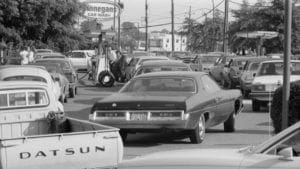What House of Cards Gets (Very) Wrong
This article was featured in our weekly newsletter, the Liberator Online. To receive it in your inbox, sign up here.
Sandy Ikeda, a professor of economics at Purchase College, SUNY, and the author of The Dynamics of the Mixed Economy: Toward a Theory of Interventionism, wrote about why everyone’s favorite TV show is wrong on its portrayal of an economic crisis. In his article for the Foundation for Economic Education, Ikeda argues that, while House of Cards is a major hit among political animals, whether they are progressive, conservative, or libertarian, its portrayal of welfare policies and shortages is extremely unrealistically.
 In the third season of House of Cards, ficticious president Frank Underwood proposed a major policy program known as “America Works,” a policy that intended to “create” millions of jobs. Despite the superhuman goals tied to the policy, the real-world consequences of such endeavor were never even questioned, leaving a lot to the imagination.
In the third season of House of Cards, ficticious president Frank Underwood proposed a major policy program known as “America Works,” a policy that intended to “create” millions of jobs. Despite the superhuman goals tied to the policy, the real-world consequences of such endeavor were never even questioned, leaving a lot to the imagination.
But as Americans binge-watch season four, Ikeda points out to another faulty portrayal of public policy and its consequences. This time around, the show’s writers failed to grasp what a gas crisis actually looks like.
During the fourth season, the show introduces the audience to Underwood’s America, where an ongoing oil crisis threatens Underwood’s popularity among voters. The audience is told to believe that gas prices have soared, nearing the $7 a gallon mark. Yet any “astute first-year econ student” will tell you that this is very unlikely, at least in a country in which price controls haven’t been enacted—yet.
According to Ikeda, if buyers and sellers are free to adjust prices, gas stations all selling gas for $7 a gallon is a fabrication. “In the absence of price controls,” Ikeda writes, “the quantity demanded and supplied will tend to be equal.” That means that markets won’t have any unexpected inventory accumulation, since most of the oil will be sold, but it will also suffer no shortages, since consumers who are scared by the high prices will simply walk away, empty-handed.
To Ikeda, the scenes depicting long lines of angry drivers waiting at gas stations while these same stations are shown running out of gas are completely unlikely to occur in a real world scenario.
Ikeda adds that, the only thing that could actually cause America to experience something similar is the implementation of a price ceiling, making it illegal for gas stations to sell gas above a certain price.
In the 1970s, the Organization of the Petroleum Exporting Countries (OPEC) flexed their monopolistic muscle by pushing oil prices up dramatically. The long lines and rationing in America that followed OPEC’s actions weren’t caused by the artificial price increase. Instead, price control policies that affected gasoline and diesel fuel prices led to the consequences often tied to what we now call the “oil crisis.” Many ignore the fact that President Richard Nixon had imposed wage and price controls on the American economy prior to the incident, and what followed was chronic shortage everywhere, not only at the pump.
While Underwood’s line about the government having “all the men with guns” may be of great inspiration to liberty advocates everywhere, the show’s ignorant remarks on economics may disappoint some viewers.
Why didn’t Netflix use an economic consultant?

























